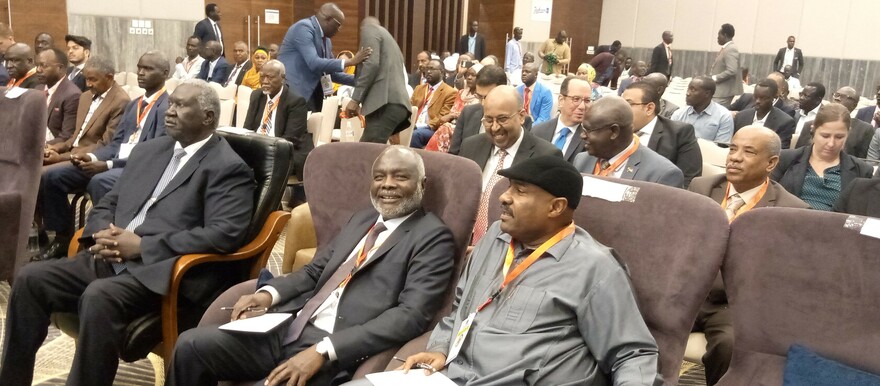In a pivotal two-day consultative meeting gathering signatories to the Juba Peace Agreement at the Radisson Blu in Juba, representatives from diverse Sudanese factions have come together to emphasize the pressing need for a lasting ceasefire and the prompt cessation of hostilities in Sudan.
The meeting was convened on Tuesday to deliberate on the ongoing conflict and its dire consequences for the nation. Here, we present the pivotal voices that resonated within this crucial assembly.
Speaking to Radio Tamazuj on Tuesday, Thuraya Abdul El-Nabi, a women’s representative from the Sudan Liberation Forces, expressed her gratitude, stating, “I would like to thank the government and people of South Sudan and all the parties involved in the Juba Peace Agreement. We came to Juba to support the call for a permanent ceasefire and an end to the ongoing war in Sudan. As women’s representatives, we support this call because women, children, and the elderly are the most affected group in this conflict. The war has caused massive waves of displacement and destroyed physical infrastructure.”
Describing the situation, Thuraya highlighted that it has remained unchanged since the beginning of 2023. She emphasized, “Up to now, the war has continued – involving the burning of villages, the killing of civilians, and the horrifying incidents of women being subjected to violence; it is a total destruction. There has been no improvement despite the signing of the Juba peace agreement, and the people have not experienced peace, stability, or security.”
Furthermore, Thuraya added, “Most of the states in Darfur have witnessed a wave of displacement. There was fighting in East Darfur state and El Fasher, but the situation is showing some signs of relatively improving.”
Thuraya emphasized that aid agencies have not offered any assistance, and she added, “We are calling for an end to the war so that they can step in and provide humanitarian aid to the displaced and refugees.”
Shaima Babiker el Haj, a representative of the Sudan Liberation Movement (SLM) / Mustafa Tambour Faction, expressed her gratitude, saying, “I would like to thank the government of South Sudan for this invitation. We joined this meeting to advocate for an end to the war in Sudan, humanitarian access for affected civilians, and the achievement of lasting peace. We engaged with all the parties involved in the Juba Peace agreement.”
Describing the worsening situation in Darfur, Shaima stated, “Regrettably, the entire Sudan is in crisis, especially the rural areas in Darfur, Kordofan, and Khartoum. Darfur is currently experiencing a dire situation with people being killed, women subjected to rape, and homes being destroyed. The RSF has gained full control over all services, and there is no peace in Darfur.”
She also conveyed a message to the warring parties in the Sudan conflict, stating, “Firstly, as the Sudan Liberation Movement / Mustafa Tambour Faction, we stand with the current Sudanese government now and in the future. Secondly, we call for an immediate ceasefire. We advocate for a transition to civilian leadership, either through military means or the surrender of rebel militias.”
Tigani Abdalla Mohamed, the Chief Negotiator for the Sudan Liberation Movement (SLM) / Mustafa Tambour Faction, expressed his gratitude towards the government of South Sudan and the negotiation committee for extending an invitation to their party.
He emphasized their stance, saying, “Our position, as the Sudan Liberation Movement led by Mustafa Tambour, is crystal clear. We align ourselves with the national army as they combat the militia that has rebelled against the army and the national sovereignty. This militia has been responsible for various forms of ethnic cleansing against the Sudanese people.”
Tigani further discussed the united efforts of armed movements in the Darfur region and the intensification of violence, noting, “Our forces have been actively engaged with the Sudanese army since the beginning of the conflict. We have urged our generals and forces to collaborate with the nearest military units to protect our nation.”
Yousra Ahmed, a civil society representative hailing from the Darfur region, expressed her deep appreciation for her participation in the consultative meeting. She emphasized, “We, as civil society, are actively engaged in this meeting with the aim of fostering a peaceful resolution to the conflict and facilitating humanitarian assistance to internally displaced persons (IDPs) and refugees in neighbouring countries.”
Elaborating on the role of civil society within the consultative meeting, Yousra described it as follows: “As civil society representatives, our primary focus is on providing humanitarian assistance. However, we encounter several challenges, including issues related to security that hinder our ability to deliver aid to the affected population. Additionally, securing funding is another challenge, but we are committed to doing our utmost to support the people in need.”
Yousra made a fervent appeal to both warring parties in the Sudan conflict, urging them to cease hostilities, emphasizing that it is the Sudanese people who bear the brunt of the ongoing fighting.




